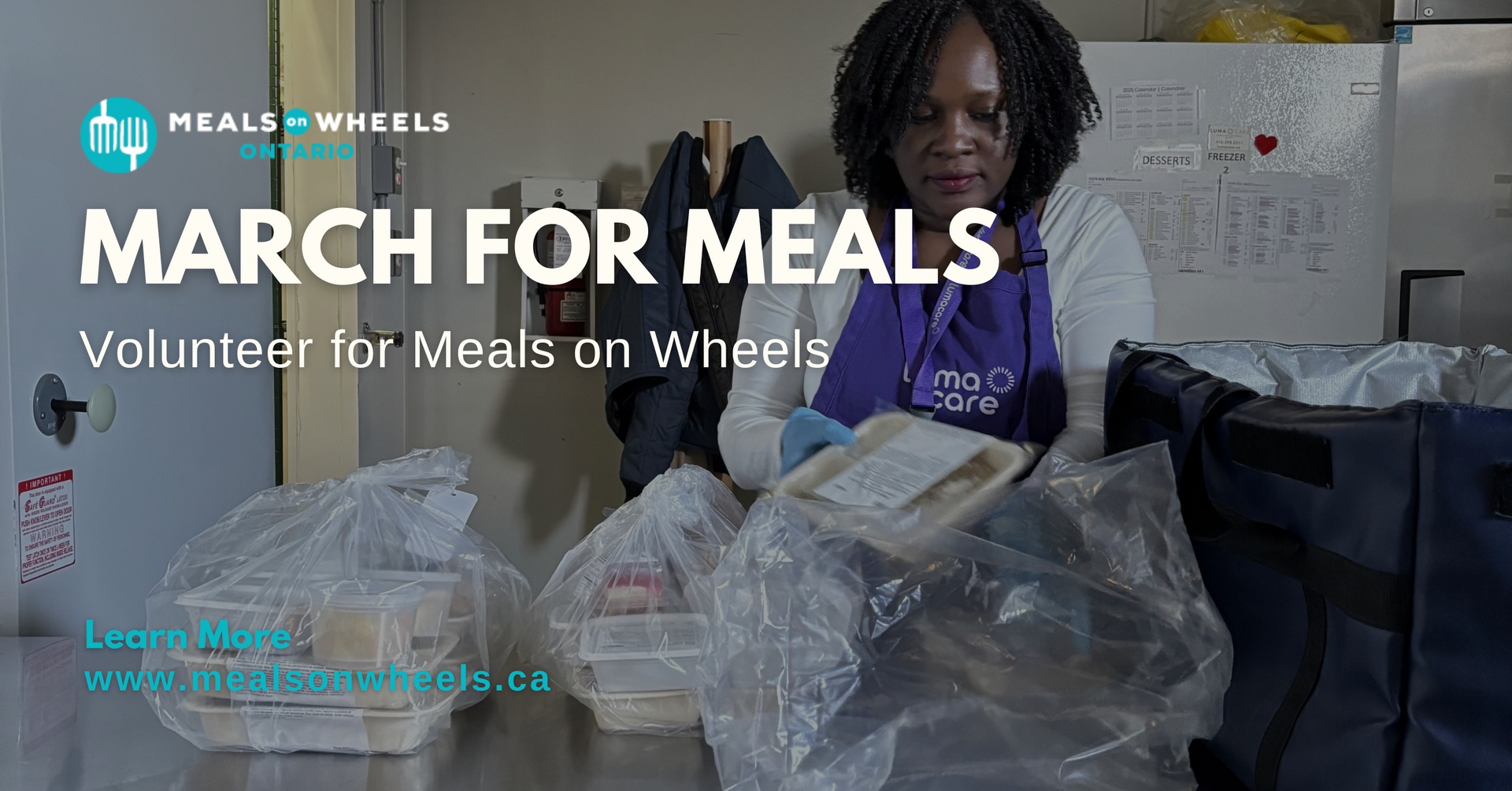Pandemic Casts a Long Shadow on Food Security

OCSP funding has helped combat food insecurity throughout the COVID-19 crisis, but food insecurity will persist for vulnerable seniors even as pandemic ends.
February 28, 2022
An estimated one in seven Canadians struggle to afford basic nutrition, according to Dietitians of Canada. This number is up from the one in eight Canadians who were food insecure prior to the COVID-19 crisis, and with costs increasing everywhere, there’s concern that the number will rise further still.
Since April 2020, the Ontario Community Support Program (OCSP) has been helping organizations like Circle of Care Sinai Health and VON North Bay get food to the vulnerable seniors and people with disabilities who need it the most, through their Meals on Wheels programs. The funding, from the Ministry for Seniors and Accessibility and administered by the Ontario Community Support Association, has been extended to March 2022. Organizations will need on-going funding past this date to continue to meet the needs of the many folks who benefit from this program.
Ensuring that isolated seniors and people with disabilities have access to reliable, nutritious food is an important preventative measure that helps to ease the strain on the healthcare system. Terry-Lynn Gravelle, the Meals on Wheels Coordinator for VON North Bay, has seen first-hand the transformative effect that access to healthy meals has had on clients in her program, like the gentleman who was on a liquid diet when he signed up for Meals on Wheels.
“Now he gets regular food to cook himself, because his health has improved,” she says. “I have another gentleman who is a diabetic and it was uncontrolled. Now his sugar is averaging eight, which is much better than [it was] in the high teens. So this funding has allowed me to assist them and improve their health, but they otherwise would not be able to afford to get fresh produce because it's too expensive.”
While the cost of fresh produce continues to rise, base funding for these organizations often remains the same. “We're renegotiating with our three different food providers, and they're all looking for 10 to 20% increases depending on the vendor and their prices. So obviously, that drives our costs up and our funding is fixed,” says Josi Sarne, Director, Community Engagement & Growth at Circle of Care. “That puts us into a position of needing to find ways to get more money, either through increasing our base funding, or raising our prices to clients, which you know, we absolutely do not want to do, or cutting back in other ways. None of those are easy choices, or ones that we want to make.”
71% of respondents to a recent OCSP survey estimated that more than 25% of their clients are facing food insecurity, and for many Meals on Wheels clients on a fixed income, even a minimal charge like $6.50 a meal is out of reach, and without additional funding, either from the government or corporate and individual donors, organizations are challenged to make tight funding stretch even further. The program is already reliant on the thousands of volunteers who not only donate their time to deliver meals and produce boxes, but also use their own vehicles, often without reimbursement for gas or mileage.
These volunteers, like Noah, a young adult with a disability who delivers with the help of his parents; David, whose delivery companion is his daughter’s 18-month old Bernedoodle dog; Lissie and Gail, a pair of friends who volunteer together; and one of the women who helped to start the North Bay Meals on Wheels program in the 70’s, are not only a friendly face for isolated seniors, in some cases they’re a lifeline.
“It's not just the food and the nutrition that [seniors are] getting,” says Lisa Rae, Director of Volunteers, Intake and MOW Services. “It's that safety check. That's very important for a lot of our seniors. And unfortunately, our volunteers have found clients on the floor periodically, throughout the year, where EMS has had to be called, or a relative has had to be called to come and attend to them.”
With Spring on the horizon and an easing of COVID-19 restrictions, life is beginning to feel a bit less precarious for many Ontarians. But the reality is, even once the pandemic ends, food insecurity will remain. “The need is out there,” Josi says, “It continues to be out there, it's not going away. And, you know, if you add on an additional pressure of costs, reducing the amount you can provide, and you've got more people, then it makes for a pretty significant challenge to continue the program the way we'd like to continue the program.”
Peter, a volunteer with Circle of Care Meals on Wheels, feels fortunate to be in a position to help others. “If we have learned nothing else during this historic pandemic, it is that in order to survive, we must do so as part of a larger community,” he says. If you have been looking for ways to help your community, either by donating time or money, please consider Meals on Wheels, as the need has never been greater.
Share
More Updates

By Karla Sealy
•
March 1, 2025
ONTARIO, March 1, 2025 - This March, the Ontario Community Support Association (OCSA) is proud to stand with communities across Ontario in support of March for Meals, an annual campaign highlighting the essential role of Meals on Wheels programs. Delivered in 181 communities across the province, these programs provide nutritious meals, social connection, and safety checks for vulnerable seniors and adults with disabilities. Meals on Wheels Ontario, with the support of belairdirect, encourages Ontarians to show their support for March for Meals and the local Meals on Wheels programs that serve their communities. Together, these programs deliver over 3 million meals annually and provide vital assistance to nearly 70,000 Ontarians. As the demand for nutritious and affordable meals grows, so too do the challenges faced by local programs—including underfunding and volunteer shortages. Now more than ever, community support is essential to ensuring these programs continue to provide a lifeline to those who need it most. “Meals on Wheels programs are a cornerstone of home and community care in Ontario, ensuring that seniors and adults with disabilities have access to healthy meals, social connection, and safety checks,” says Deborah Simon, CEO of OCSA. “However, these programs face growing demand and funding challenges. March for Meals is an opportunity for all Ontarians to rally around these essential services and support their sustainability so that no one is left behind.” During the month of March, community-based Meals on Wheels programs across the province will host special events, engage local officials, and encourage community participation to raise awareness and support for these critical services. OCSA invites Ontarians to learn more about the impact of Meals on Wheels and explore ways to get involved. For more information on March for Meals and how you can support your local Meals on Wheels program, visit Meals on Wheels Ontario . About OCSA The Ontario Community Support Association (OCSA) champions a strong, sustainable home and community care sector in Ontario. The association represents over 220 not-for-profit organizations that deliver high-quality services that help seniors, people with disabilities, and those with complex care needs remain independent in their homes and communities. These proactive and cost-effective services prevent unnecessary hospitalizations, emergency room visits and premature institutionalization. For more information visit www.ocsa.on.ca or @OCSATweets For media inquiries please contact: Karla Sealy (she/her) Manager of Communications 416-256-3010/1-800-267-6272, ext 242 karla.sealy@ocsa.on.ca
CONTACT US
180 Dundas St. W., Suite 1400-B,Toronto, ON M5G 1Z8
416-256-3010 | 1-800-267-OCSA
info@ocsa.on.ca
Charitable Registration #:
13426 9505 RR0001
HOURS
Monday - Friday 8:30am-4:30pm
INFORMATION
OCSA is being hosted on the traditional territory of many nations including the Mississaugas of the Credit, the Anishnabeg, the Chippewa, the Haudenosaunee and the Wendat peoples and is now home to many diverse First Nations, Inuit and Métis peoples. We also acknowledge that Toronto is covered by Treaty 13, signed with the Mississaugas of the Credit and the Williams Treaties signed with multiple Mississaugas and Chippewa bands.





